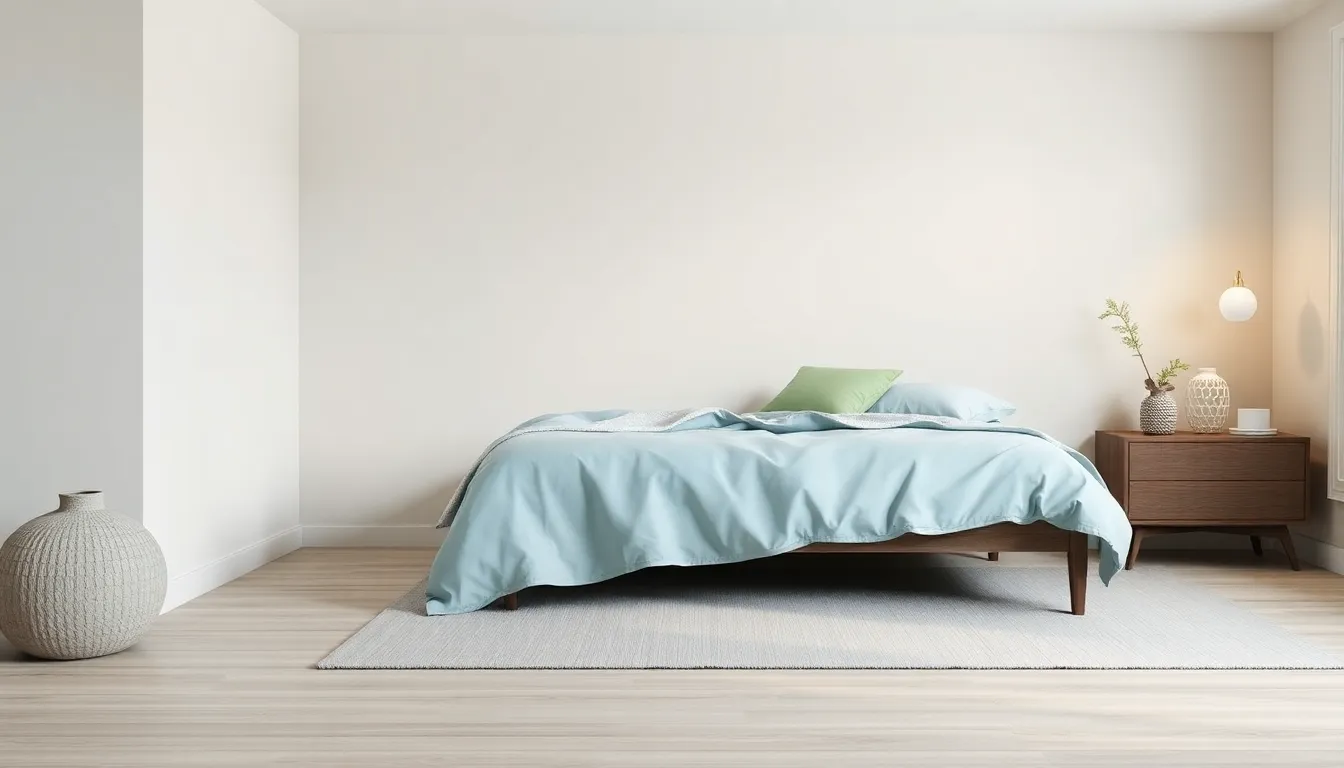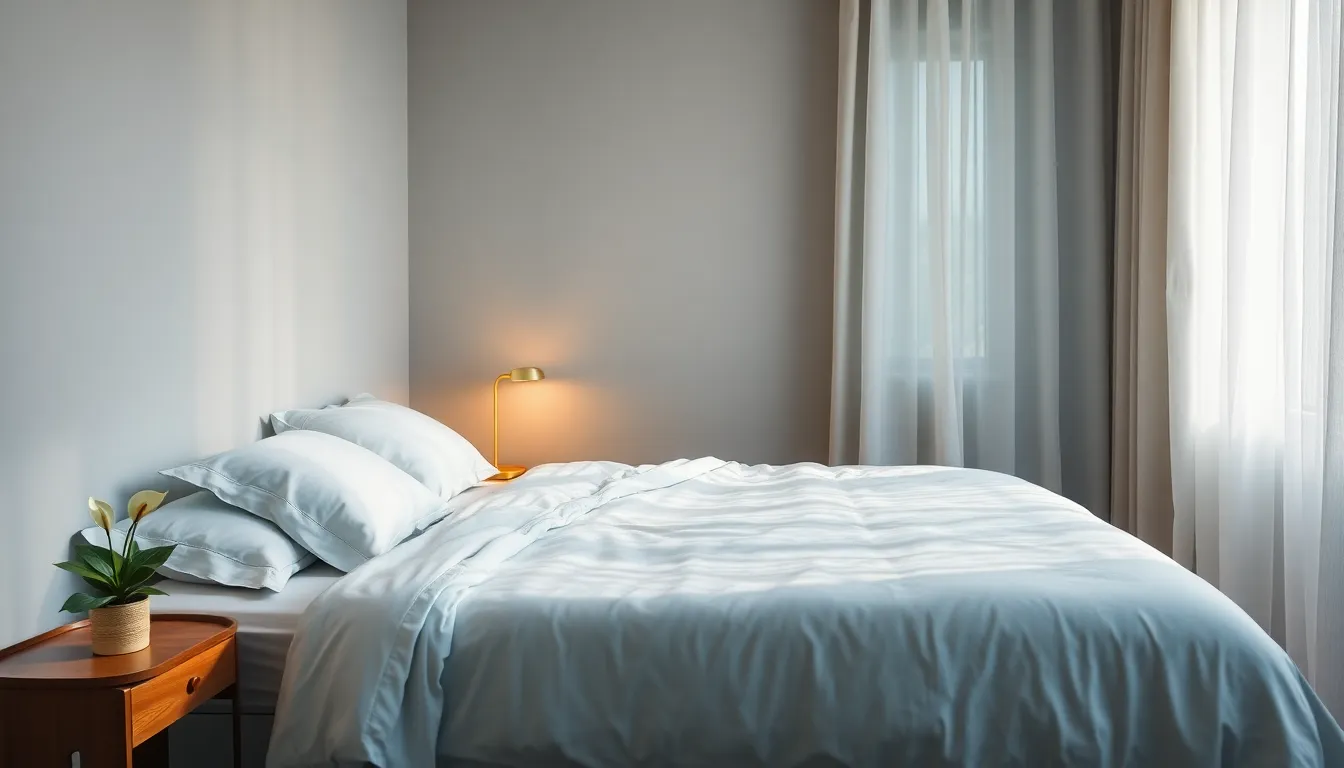Creating a restful bedroom environment goes beyond just picking the right colors and decor. It’s about harnessing the ancient art of feng shui to promote tranquility and enhance sleep quality. By strategically arranging furniture and choosing calming elements, anyone can transform their bedroom into a sanctuary for rest.
Feng shui principles focus on balancing energy flow, or “chi,” which can significantly impact how well someone sleeps. From the placement of the bed to the choice of textiles, every detail matters. Understanding these principles can lead to a more peaceful sleep experience, making it easier to unwind after a long day. Embracing bedroom feng shui isn’t just a trend; it’s a pathway to rejuvenation and harmony.
Table of Contents
ToggleUnderstanding Bedroom Feng Shui
Understanding bedroom feng shui involves recognizing how spatial arrangements can influence energy flow and sleep quality. Proper alignment and strategic placement of furniture can significantly enhance relaxation and promote restful sleep.
The Principles of Feng Shui
The principles of feng shui focus on balance, harmony, and the flow of energy, or “chi.” Key concepts include:
- Bagua Map: Divides a space into nine areas, each representing different aspects of life, such as relationships and health.
- Yin and Yang: Emphasizes balance between calming (yin) and vibrant (yang) energies. Bedrooms should predominantly feature yin elements for tranquility.
- Clutter Control: Encourages decluttering to allow free movement of energy. A tidy space promotes peace and reduces distractions.
- Elemental Harmony: Integrates five elements—wood, fire, earth, metal, and water—to create balance. For example, using soft textures and natural materials fosters warmth and comfort.
The Importance of Sleep in Feng Shui
Sleep plays a crucial role in overall well-being, and feng shui highlights its significance by creating an environment conducive to restful slumber. Considerations include:
- Bed Placement: Positioning the bed against a solid wall provides support and a sense of safety, enhancing restfulness.
- Color Schemes: Utilizing calming colors, such as soft blues and greens, nurtures relaxation and promotes better sleep quality.
- Light Management: Controlling natural and artificial light can influence circadian rhythms. Blackout curtains and dimmable lights help create a serene sleep environment.
- Air Quality: Ensuring good air flow and incorporating plants can improve air quality, reducing stress and enhancing comfort.
Applying these feng shui principles promotes deeper, more restorative sleep, ultimately contributing to rejuvenation and balance in life.
Key Elements of Bedroom Feng Shui

Effective bedroom feng shui incorporates essential elements such as bed placement and color schemes to enhance sleep quality. These components contribute to creating a restful atmosphere conducive to rejuvenation.
Bed Placement
Proper bed placement stands as a cornerstone of bedroom feng shui. Position the bed against a solid wall for support and stability. Ensure the bed allows for easy access on both sides, promoting a sense of security and balance. Avoid placing the bed directly in line with the door, as this positioning can disrupt sleep due to excessive energy flow. Utilize a headboard to create a protective barrier, further enhancing feelings of safety. Maintain a distance from clutter, ensuring it does not obstruct the flow of positive energy in the bedroom.
Color Schemes
Color schemes play a crucial role in establishing a calming environment. Opt for soft, soothing colors such as blues, greens, and neutrals to promote relaxation and tranquility. Avoid overly bright or stimulating colors, which can create restlessness. Consider integrating earth tones to foster a sense of grounding and stability. Limit intense contrasts, as they can disrupt the visual harmony of the space. Incorporate color through bedding, wall paint, and decorative elements to maintain a cohesive, calming aesthetic that supports restful sleep.
Creating a Calming Atmosphere
Fostering a calming atmosphere in the bedroom enhances sleep quality and mental clarity. Strategic choices in lighting and spatial arrangements play a crucial role in promoting tranquility.
Lighting Considerations
Lighting holds significant importance in a feng shui bedroom. Soft, warm light creates a soothing environment. Utilize bedside lamps with dimmers to adjust brightness throughout the night, providing flexibility based on individual needs. Emerging studies indicate that exposure to harsh, bright light can disrupt sleep patterns. Instead, opt for covered bulbs or light-filtering curtains to minimize glare while allowing natural light during the day. For additional calming effects, consider incorporating Himalayan salt lamps or candles, both of which create a serene ambiance with soft, warm tones.
Decluttering Your Space
Decluttering promotes positive energy flow, essential for creating a restful environment. A clean and organized bedroom minimizes distractions that disrupt relaxation. To achieve this, remove items that do not serve a purpose, such as excess furniture or unused decor. Designate storage solutions, like baskets or bins, to ensure a neat appearance. Moreover, ensure that surfaces remain clear and inviting, as visual clutter can contribute to anxiety. Regularly reassess items in the bedroom to maintain an environment that fosters peace and tranquility.
Enhancing Sleep Quality
Enhancing sleep quality involves practical applications of feng shui principles. Utilizing natural materials and incorporating plants can significantly affect the bedroom’s energy and overall tranquility.
Use of Natural Materials
Natural materials promote a sense of grounding and calmness in the bedroom. Incorporating wood, cotton, and linen materials in furniture and bedding fosters a connection with nature. Bed frames made of solid wood provide sturdy support, while cotton and linen sheets enhance comfort with breathable, soft textures. Opting for organic materials, free from synthetic chemicals, ensures a healthier sleep environment. This choice reflects a commitment to well-being, positively impacting sleep quality.
Incorporating Plants
Incorporating plants enhances the bedroom’s air quality and aesthetic appeal. Plants like lavender, peace lilies, and snake plants promote relaxation while purifying the air, creating a serene atmosphere. These plants also introduce life and energy, contributing to a balanced environment. Positioning plants near natural light sources ensures they thrive, further enhancing the calming effects. The presence of greenery nurtures the connection to nature, fostering peace and promoting restorative sleep.
Implementing bedroom feng shui principles can transform an ordinary space into a sanctuary for sleep. By focusing on energy flow and creating a calming atmosphere, individuals can significantly enhance their sleep quality. Strategic bed placement and the use of soothing colors contribute to a restful environment that promotes relaxation.
Incorporating natural materials and plants fosters a deeper connection with nature while improving air quality. This holistic approach not only supports better sleep but also nurtures overall well-being. Embracing these feng shui techniques paves the way for a harmonious bedroom, ultimately leading to a more rejuvenating sleep experience.




